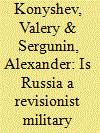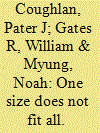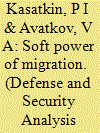|
|
|
Sort Order |
|
|
|
Items / Page
|
|
|
|
|
|
|
| Srl | Item |
| 1 |
ID:
136074


|
|
|
|
|
| Summary/Abstract |
“Smart Defense” is NATO's new approach to risk- and burden-sharing, which has been a chronic problem within the alliance since the 1950s. Numerous solutions have been proposed, but initiatives resulting in more equitable burden-sharing have never been fully implemented. There are two driving forces influencing a county's willingness to support such initiatives – the economic theory of alliances and the risks posed by the implementation of capability sharing. The authors examine each of these and propose that rather than aiming for group consensus on the production of capabilities, NATO should focus on interoperability through support functions. This approach provides the most likely solution for connecting the forces, doctrine, procedures, standards and other factors of joint capability production such that country leaders find the risks of doing so to be politically and militarily acceptable.
|
|
|
|
|
|
|
|
|
|
|
|
|
|
|
|
| 2 |
ID:
136736


|
|
|
|
|
| Summary/Abstract |
“Smart Defense” is NATO's new approach to risk- and burden-sharing, which has been a chronic problem within the alliance since the 1950s. Numerous solutions have been proposed, but initiatives resulting in more equitable burden-sharing have never been fully implemented. There are two driving forces influencing a county's willingness to support such initiatives – the economic theory of alliances and the risks posed by the implementation of capability sharing. The authors examine each of these and propose that rather than aiming for group consensus on the production of capabilities, NATO should focus on interoperability through support functions. This approach provides the most likely solution for connecting the forces, doctrine, procedures, standards and other factors of joint capability production such that country leaders find the risks of doing so to be politically and militarily acceptable.
|
|
|
|
|
|
|
|
|
|
|
|
|
|
|
|
| 3 |
ID:
136733


|
|
|
|
|
| Summary/Abstract |
In contrast with a widespread perception of Russia as an expansionist power in the Arctic, this article argues that Moscow does not seek military superiority in the region. Rather, Moscow's military strategies in the Arctic pursue three major goals: first, to demonstrate and ascertain Russia's sovereignty over its exclusive economic zone and continental shelf in the region; second, to protect its economic interests in the High North; and third, to demonstrate that Russia retains its great power status and still has world-class military capabilities. The Russian military modernization programs are quite modest and aim at upgrading the Russian armed forces in the High North rather than providing them with additional offensive capabilities or provoking a regional arms race. The Russian ambitions in the Arctic may be high, but they are not necessarily implying the intentions and proper capabilities to confront other regional players by military means. On the contrary, Moscow opts for soft rather than hard power strategy in the Arctic.
|
|
|
|
|
|
|
|
|
|
|
|
|
|
|
|
| 4 |
ID:
136072


|
|
|
|
|
| Summary/Abstract |
In contrast with a widespread perception of Russia as an expansionist power in the Arctic, this article argues that Moscow does not seek military superiority in the region. Rather, Moscow's military strategies in the Arctic pursue three major goals: first, to demonstrate and ascertain Russia's sovereignty over its exclusive economic zone and continental shelf in the region; second, to protect its economic interests in the High North; and third, to demonstrate that Russia retains its great power status and still has world-class military capabilities. The Russian military modernization programs are quite modest and aim at upgrading the Russian armed forces in the High North rather than providing them with additional offensive capabilities or provoking a regional arms race. The Russian ambitions in the Arctic may be high, but they are not necessarily implying the intentions and proper capabilities to confront other regional players by military means. On the contrary, Moscow opts for soft rather than hard power strategy in the Arctic.
|
|
|
|
|
|
|
|
|
|
|
|
|
|
|
|
| 5 |
ID:
136073


|
|
|
|
|
| Summary/Abstract |
The Democratic People's Republic of Korea (DPRK) justifies its nuclear weapon arsenal with the concept of deterrence. It means that it will try to miniaturize and modernize its warheads and missiles. This leads to a first-use doctrine of nuclear weapons. Obama's policy of engagement does not offer a solution to the North Korean nuclear issue as yet. In the context of its policy of critical engagement with the DPRK, the European Union has three key interests: regional peace and stability, denuclearization, and human rights. The Conference on Security and Cooperation (CSCE) could be a precedent. The CSCE process was based on three “baskets”: security, economics, and humanitarian. The multilateral Trans-Pacific Partnership is a step in this regard. This article looks at three theoretical approaches: realism, liberal institutionalism, and liberal internationalism. It concludes that a political strategy to create a stable North Korean peninsula has to go beyond nuclear deterrence that is based on the realist notion of balance of power.
|
|
|
|
|
|
|
|
|
|
|
|
|
|
|
|
| 6 |
ID:
136735


|
|
|
|
|
| Summary/Abstract |
The Democratic People's Republic of Korea (DPRK) justifies its nuclear weapon arsenal with the concept of deterrence. It means that it will try to miniaturize and modernize its warheads and missiles. This leads to a first-use doctrine of nuclear weapons. Obama's policy of engagement does not offer a solution to the North Korean nuclear issue as yet. In the context of its policy of critical engagement with the DPRK, the European Union has three key interests: regional peace and stability, denuclearization, and human rights. The Conference on Security and Cooperation (CSCE) could be a precedent. The CSCE process was based on three “baskets”: security, economics, and humanitarian. The multilateral Trans-Pacific Partnership is a step in this regard. This article looks at three theoretical approaches: realism, liberal institutionalism, and liberal internationalism. It concludes that a political strategy to create a stable North Korean peninsula has to go beyond nuclear deterrence that is based on the realist notion of balance of power.
|
|
|
|
|
|
|
|
|
|
|
|
|
|
|
|
| 7 |
ID:
136075


|
|
|
|
|
| Summary/Abstract |
A critical element in implementing a compensation scheme including nonmonetary incentives (NMIs) is recognizing that preferences vary widely across Service members. There are at least three sources of variability: across different population classes, across individuals within a population class, and across NMI packages for a particular individual. Surveys across different military communities, ranks, and years of Service show the difficulty of identifying any NMI that has significant value for even 50% of the active duty force. At the same time, approximately 80% of the surveyed Service members expressed a significant positive value for at least one NMI. Therefore, one-size-fits-all incentive packages will not be nearly as effective as more personalized incentive packages. The authors discuss variability in Service member NMI preferences and outline an approach to implementing personalized NMI packages in military compensation through a sealed-bid reverse auction, where Service members select individual NMIs from a “cafeteria-style” menu of options.
|
|
|
|
|
|
|
|
|
|
|
|
|
|
|
|
| 8 |
ID:
136737


|
|
|
|
|
| Summary/Abstract |
A critical element in implementing a compensation scheme including nonmonetary incentives (NMIs) is recognizing that preferences vary widely across Service members. There are at least three sources of variability: across different population classes, across individuals within a population class, and across NMI packages for a particular individual. Surveys across different military communities, ranks, and years of Service show the difficulty of identifying any NMI that has significant value for even 50% of the active duty force. At the same time, approximately 80% of the surveyed Service members expressed a significant positive value for at least one NMI. Therefore, one-size-fits-all incentive packages will not be nearly as effective as more personalized incentive packages. The authors discuss variability in Service member NMI preferences and outline an approach to implementing personalized NMI packages in military compensation through a sealed-bid reverse auction, where Service members select individual NMIs from a “cafeteria-style” menu of options.
|
|
|
|
|
|
|
|
|
|
|
|
|
|
|
|
| 9 |
ID:
136730


|
|
|
|
|
| Summary/Abstract |
The article studies the range of problems that have emerged due to the growing immigration from Muslim countries into the European Union (EU). While describing the functions of immigrants' communities, the authors focus on their political role in the receiving states. The study of the historical development of government–diaspora relations in three cases (the UK, France, and Germany) shows that Muslim communities' political influence does not reflect their economic and cultural role, which in the future might threaten the EU security, unless these countries develop a new approach to an “acculturation” policy.
|
|
|
|
|
|
|
|
|
|
|
|
|
|
|
|
| 10 |
ID:
136071


|
|
|
|
|
| Summary/Abstract |
The article studies the range of problems that have emerged due to the growing immigration from Muslim countries into the European Union (EU). While describing the functions of immigrants' communities, the authors focus on their political role in the receiving states. The study of the historical development of government–diaspora relations in three cases (the UK, France, and Germany) shows that Muslim communities' political influence does not reflect their economic and cultural role, which in the future might threaten the EU security, unless these countries develop a new approach to an “acculturation” policy.
|
|
|
|
|
|
|
|
|
|
|
|
|
|
|
|
| 11 |
ID:
136070


|
|
|
|
|
| Summary/Abstract |
A combination of threat analysis and “subterranean forces” (such as proclivities to fight conventional wars as compared to asymmetric ones) leads the USA to prefer focusing on the threats from China rather than those emanating from the Middle East.
|
|
|
|
|
|
|
|
|
|
|
|
|
|
|
|
| 12 |
ID:
136729


|
|
|
|
|
| Summary/Abstract |
A combination of threat analysis and “subterranean forces” (such as proclivities to fight conventional wars as compared to asymmetric ones) leads the USA to prefer focusing on the threats from China rather than those emanating from the Middle East.
|
|
|
|
|
|
|
|
|
|
|
|
|
|
|
|
|
|
|
|
|